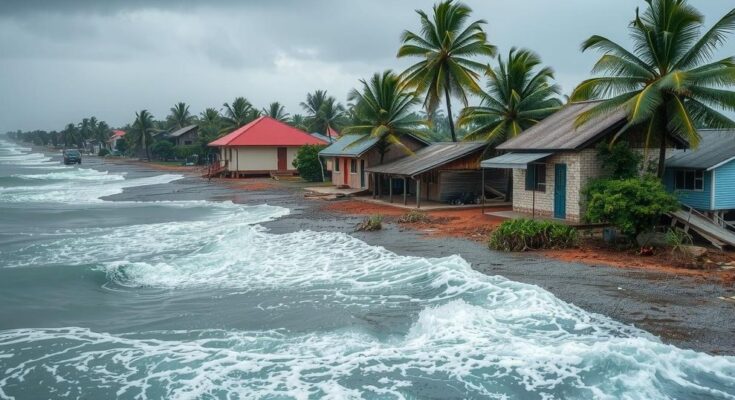Tropical Cyclone Chido made landfall on December 15, 2024, in Cabo Delgado, Mozambique, affecting around 2 million people. Authorities have raised alerts about the potential impact on infrastructure. Early warnings and evacuations were initiated, with WFP delivering emergency food assistance. Comprehensive assessments are planned for the most affected districts as agencies continue their response efforts.
On December 15, 2024, Tropical Cyclone Chido made landfall in Mecufi, located in the Cabo Delgado province of Mozambique. The cyclone poses a significant threat, with approximately 2 million individuals identified as being at risk; among them, 627,000 are considered at high risk and 1.4 million at moderate risk. The local meteorological authorities have raised concerns regarding the potential impacts on key infrastructure, including river basins, roads, electricity poles, and health facilities, thereby prompting immediate response and preparedness measures.
The districts most vulnerable to the cyclone include Mecufi, Chiure, Metuge, Pemba, Namuno, Montepuez, and Ancuabe in Cabo Delgado, along with Memba, Nacaroa, and Erati in neighboring Nampula province. Prior to the cyclone, early warning messages were disseminated and voluntary evacuation orders were initiated, commencing on December 8 in Nampula and December 12 in Pemba, effectively reaching over 400,000 people across affected areas as part of the Anticipatory Action Plan.
In response to the emergency, the World Food Programme (WFP) has mobilized resources to provide immediate food assistance, delivering aid to around 500 families displaced by the cyclone in temporary accommodation centers in Pemba within a 24-hour period. Similarly, in Mogincual, Nampula, food provisions were established in temporary shelters, supported by the National Institute for Disaster Management (INGD) and the WFP.
Plans for comprehensive multi-sectoral assessments are set for the Mecufi and Chiure districts to further evaluate the cyclone’s impacts and inform ongoing relief efforts. Coordinated actions and quick responses will be crucial in mitigating the effects of Cyclone Chido and assisting the affected communities effectively.
The tropical cyclones in Mozambique often lead to devastating consequences, emphasizing the need for readiness and swift response mechanisms. The country has been increasingly prone to such extreme weather phenomena, exacerbated by climate change. The WFP and local authorities continuously engage in anticipatory actions that prepare and educate communities at risk about potential emergencies. Cyclone Chido’s landfall not only highlights the vulnerability of numerous communities in Cabo Delgado and Nampula provinces but also stresses the importance of coordinated disaster response efforts.
The impact of Tropical Cyclone Chido, which recently struck Cabo Delgado, has posed significant risks to approximately 2 million people. Proactive measures are underway, including evacuation instructions and food aid deliveries to those affected. The situation underscores the necessity for ongoing assessments and support from organizations such as the WFP to mitigate the cyclone’s adverse effects on vulnerable populations or key infrastructure, ensuring a more resilient recovery for the communities involved.
Original Source: reliefweb.int




